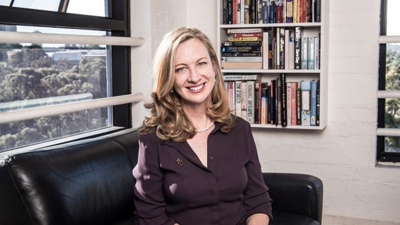Professor Karen Canfell Compass Trial Interview

Australian Women Join Forces To Beat Cervical Cancer
Women all over the globe will soon benefit from a world-first clinical trial thanks to the women of Australia.
The Compass Trial is finding the most effective strategies for optimising cervical screening in HPV vaccinated women. The trial is the largest clinical trial ever to be conducted in Australia, aiming to recruit 82,303 women. Results from the first phase of the trial supported major changes to the National Cervical Screening Program in 2017.
Now, the VCS Foundation is calling on 8,000 Australian women aged 25-38 years to participate in the trial to ensure that we understand the best way to refine HPV testing especially in women who have been offered HPV vaccination.
The trial is being led by the VCS Foundation and Cancer Council NSW. VCS Foundation is the only organisation worldwide to have had both a cervical screening registry and an HPV vaccination registry. Associate Professor Marion Saville, co-Principal Investigator and VCS Foundation Executive Director, says Phase 2 of the trial is now crucial to influence evidence-based practice here and around the world. "For the scientific evidence generated to be strong and robust we need a significant number of participants, in this case 82,303 Australian women," she says.
Having lost her mum to the disease, Compass Trial participant Tess Sketchley says joining the trial was a no brainer.
"As a child, I saw my mum die from cervical cancer. I wouldn't want that to happen to any other woman," she says.
"That's why I am in the Compass trial and why I encourage all women aged 25-38 to join me."
Participating general practitioner, Dr Meredith Frearson of Adelaide Healthcare says she's honoured to contribute to the data that will ultimately improve screening processes here and around the world. "The trial will give us broad Australian data that will be relevant and provide clarity for Australian women as to the validity of our new Cervical Screening Program," she says.
"In women's health in general in Australia we often lack local data and I believe that this is important to have behind me when I am speaking with individual women in my practice.
"This trial (the largest of its kind) will provide data to show the benefits of the renewed program and will show science in action for the benefit of day to day Clinical Practice for Australian women in particular but also for women around the world as well."
Associate Professor Marion Saville, co-Principal Investigator and VCS Foundation Executive Director says nearly all cervical cancers are caused by persistent infection with certain types of HPV (Human Papillomavirus).
"HPV testing is a better way to find lesions that otherwise may become cancers but we are also using the trial to identify the best way to refine the testing to avoid sending too many healthy women for further tests (false positive tests)" she says.
"In the context of recent media on Australia's future elimination of cervical cancer, understanding how we can further improve screening in women, particularly those who have been vaccinated against HPV, is an important step towards eliminating this disease."
Compass is recruiting women in Victoria, South Australia and New South Wales aged 25-38 years. To join the trial, which is currently available at more than 570 practices, interested women are encouraged to visit compasstrial.org.au or to call the Compass hotline on 1800 611 635 to find their nearest participating practice and make an appointment to sign up.
 Interview with Professor Karen Canfell, Co-Principal Investigator of Compass
Interview with Professor Karen Canfell, Co-Principal Investigator of Compass
Question: Can you tell us about the Compass Trial by VCS Foundation and Cancer Council NSW?
Professor Karen Canfell: The Compass Trial is providing further important evidence on the effectiveness of our new national Cervical Screening Program, and it is also looking at new options for further improvements in terms of the way women are managed in the program. We started a pilot version of the trial in 2014 recruiting 5,000 women in Victoria, and we are now in the last year of recruitment of the main trial. We aim to recruit 82,000 women nationwide, making Compass the largest clinical trial ever to be conducted in Australia.
The trial is coordinated by Cancer Council NSW and VCS Foundation, both organisation are not-for-profits with the common goal of reducing the impact of cervical cancer in Australia and internationally, so it is a great collaborative effort.
Question: What do you expect to achieve with this clinical trial?
Professor Karen Canfell: Cervical cancer is one of the greatest threats to women's health. It is almost always causes by the Human Papillomavirus (HPV) and is highly preventable. Compass will generate the first trial-based evidence for cervical screening in women who have been offered the HPV vaccine. Last year the World Health Organisation announced the elimination of cervical cancer as a priority, and through our world first data Compass is helping to fill in gaps in research on cervical cancer prevention to bring us closer to elimination.
Question: Can you talk us through the results from Phase 1 of the trial?
Professor Karen Canfell: The results from the pilot study are building on previous international evidence which supported a major change to the National Cervical Screening Program in 2017, when two-yearly pap tests changed to five-yearly Cervical Screening Tests (CSTs) which involve testing for HPV DNA. Our Phase 1 results support the use of screening for HPV virus as the most effective way of preventing cervical cancer. We were extremely happy with this result as it indicates that Australia is improving on what has already been a very effective program.
 Question: How important, to you, is it that this clinical trial is being led by female researchers, GPs and everyday women?
Question: How important, to you, is it that this clinical trial is being led by female researchers, GPs and everyday women? Professor Karen Canfell: Compass is coordinated by a dedicated team of investigators, collaborators and advisory committees, with recruitment being conducted by thousands of general practitioner and nurses across Australia. We are proud to have a workforce with a high percentage of females at the front line, particularly when women are often unrepresented in the medical and science industries.
It is essential that women are involved at all levels of the research process. This is even more important in a women's health study; I believe women should be empowered to inform how their health will be managed. So far over 75,000 women have consented to take part in the trial. We are so grateful for their contribution in helping to better cervical cancer prevention and treatment services for generations of women to come.
Question: How can Australian women participate in the Compass Trial?
Professor Karen Canfell: Women aged 25-38 can sign up to the trial by visiting a participating GP practice for routine cervical screening.
To find a participating GP you can visit the trial website at http://www.compasstrial.org.au/ or speak to our expert physician through the Compass hotline on 1800 611 635.
Question: What is involved for participants of the Compass Trial?
Professor Karen Canfell: In the Compass trial, you will have a test taken from your cervix in exactly the same way as you would usually have a routine Cervical Screening Test. Your sample will then be randomized to be tested with either a HPV test (return for screening in 5 years) or a Pap smear (return in 2.5 years). Once your health practitioner has your results they will let you know what follow-up is required.
Question: What is the main message you'd like to spread this coming International Women's Day?
Professor Karen Canfell: I hope all women can feel empowered to have their voices heard and take action on issues they are passionate about, in whatever field they choose.
Interview by Brooke Hunter
Photo by Brooke Cagle on Unsplash
MORE



